Iakionhnhéhkwen
WE SUSTAIN LIFE

Wakerakátste
LOUISE MCDONALD HERNE
Visionary and Founder
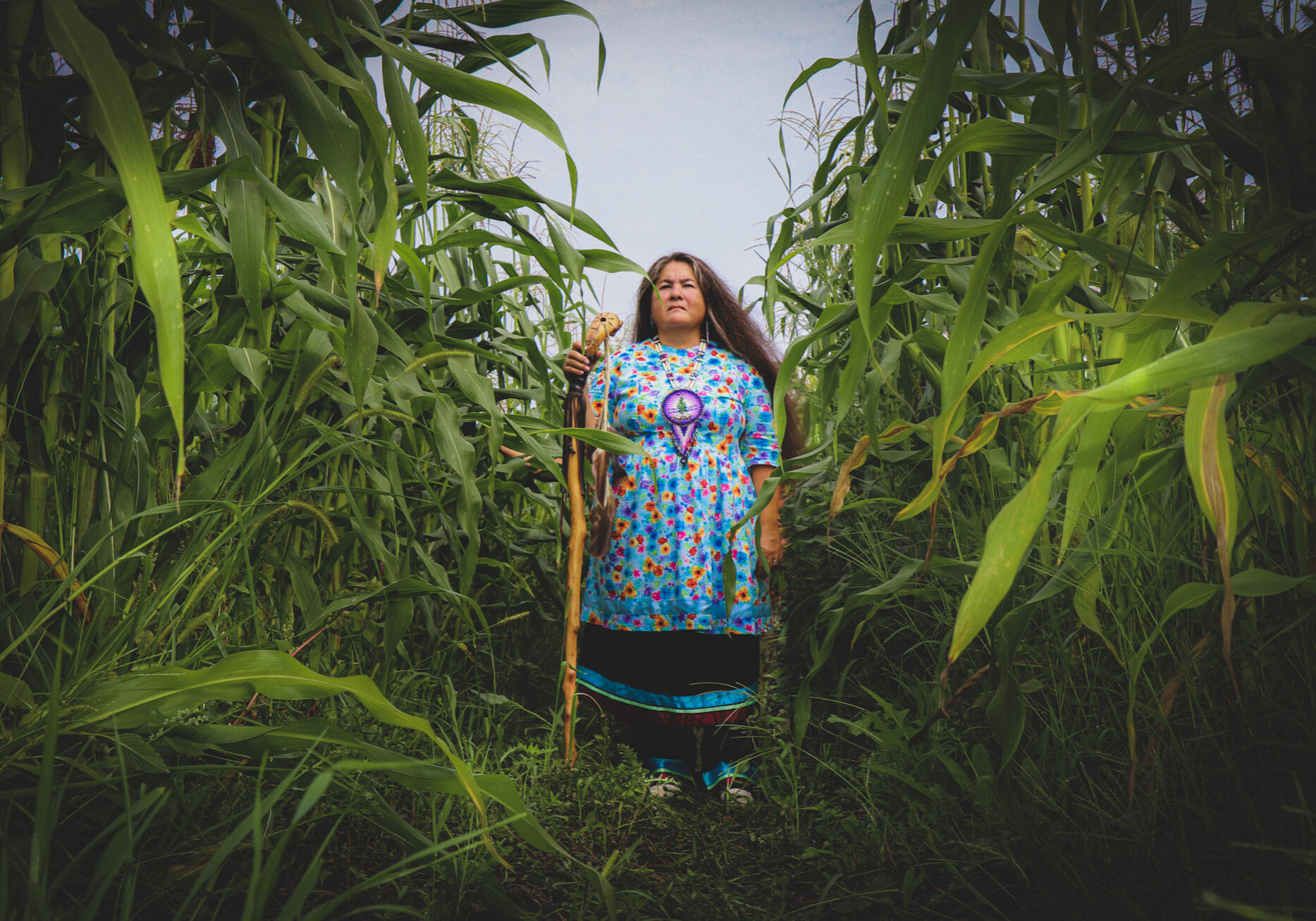
Wakerahkáhtste Louise McDonald Herne is a condoled Bear Clan Mother for the Mohawk Nation Council. She is a trusted advisor for families and community youth working closely with them in their homes and schools. She bestows traditional names in the longhouse and provides spiritual counsel for all those seeking support.
Through her work as a matrilineal leader and as a mother, she is a founding member of Konón:kwe Council, a circle of Mohawk women working to reconstruct the power of their origins through education, empowerment and trauma-informed approaches. Louise champions the philosophy of Kahnisténhsera, "Mother Law" --a natural law that binds Ohnwehón:we, or Indigenous kinship society. She is the lead conductor of the Moon Lodge Society, convening women and girls on a monthly basis in line with the full moon cycle. Wakerahkáhtste is the principal organizer and leader of Oheró:kon, a traditional Rites of Passage ceremony for Mohawk youth. Since 2005, she has guided hundreds of community families and volunteers through self-reflection and Ratinonhsón:ni cultural instruction and ceremony.
Wakerahkáhtste presented at the United Nations Permanent Forum on Indigenous Issues and lectures regularly at universities throughout Canada and the United States on Ratinonhsón:ni philosophies and self-determination in regards to women. Wakerahkáhtste has been the Distinguished Scholar in Indigenous Learning at McMaster University Institute for Innovation and Excellence in Teaching and Learning (MIIETL) and received an honorary PhD from SUNY Canton. Her most recent work includes a feature in the award winning documentary film, "Without a Whisper: Konnon:kwe" about the Ratinonhsón:ni women's influence on the women's rights movement.
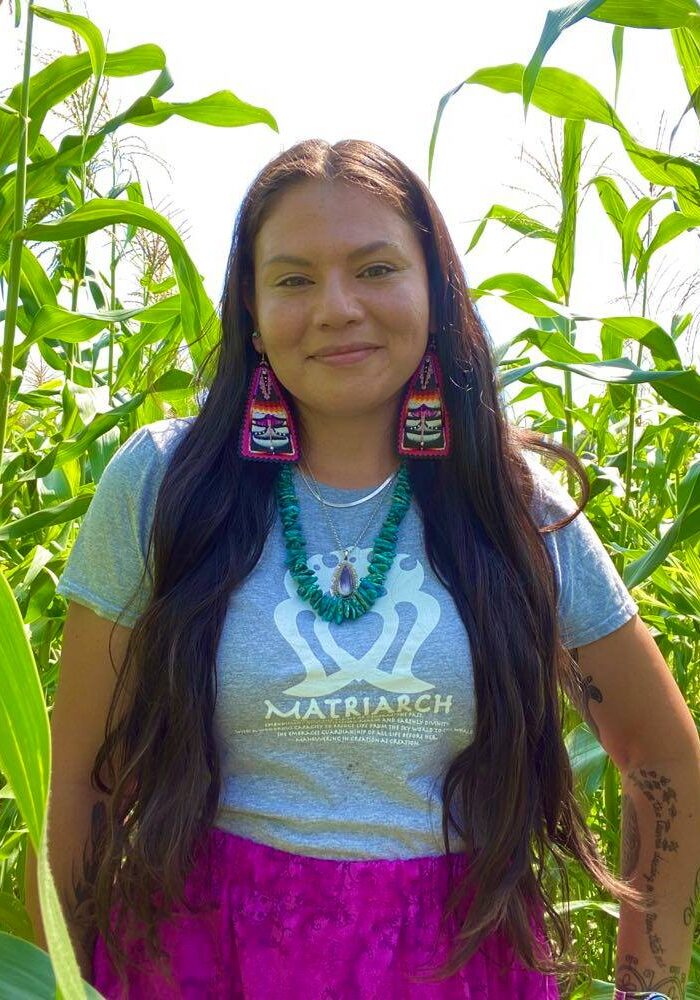
Kaienahá:wis
Jonel iontákiats
Jonel Beauvais is a Wolf clan, Kanien'kehà:ka and the proud mother of three children and chosen auntie, sister and friend too many. Jonel works diligently to empower and induce healing within all Native/Indigenous communities in order to prosper in the Ratinonhsonni teachings of good medicine and good minds.
Jonel is currently working for Kahwatsiraien:ton she has dedicated six years as a council member and Lead Auntie for all adolescent girls entering their first year of fasting in Ohero:kon “Under the Husk”, which is the Rights of Passage for youth in Ahkwesáhsne.
Jonel is also the founder of the Welcome Home Circle in Ahkwesáhsne, which is inspired by her own carceral experience and the undeniable need for representation and support for those directly and indirectly impacted by the criminal system, especially in Native communities. She is actively working on their “Tiny Home Project”, which will give those transitioning back into the community peer support and safe housing to ensure those coming home get the opportunity to demonstrate transformational justice.
Jonel recently spent five years cultivating support and experience around violence with the Seven Dancers Coalition, as a Community Outreach worker located in Upstate New York on the U.S./Can Political border of her home territory in Ahkwesáhsne. Jonel was a recipient of 2020 Visionary Voice Award, nominated by the New York State Coalition Against Sexual Assault, granted by the National Sexual Assault Resource Center.
Jonel is also a member of the Section 84 parole board of Ahkwesáhsne and the Neh Ka'nikonrí:io Council which is a restorative justice initiative that integrates indigenous ways of mediation to reduce incarceration and provide a more interpersonal means of healing for both parties.
In 2019 she was picked one of ten women nationally to represent a fellowship for formally incarceration or directly impacted woman of color, through the Community Change organization. With peer-to-peer mentorship, community organizing skill building and cultivating change in the hearts of women directly impacted by the social violence, prison systems and immigration. In 2020, Jonel was accepted to be on a national cohort of women through Columbia University’s, Women Transcending fellowship, organized to support formerly incarcerated women build power, gain resources and strengthen leadership development. In addition Jonel was extended an invitation to sit on the national #FREEHER board with the Circle for Justice innovations, which give out grant opportunities for women of color who are in their communities working to address mass incarceration.
Jonel is often invited to various speaking engagements, recently being invited to represent the U.S. as a Tribal delegate at the Third Annual Trilateral working ground in Mexico City where Indigenous representatives from the U.S., Canada and Mexico addressed adversities faced by Indigenous women (Oct. 2018).
Jonel's passion is to share her life experiences as a native woman who has witnessed and lived the adversities of addiction, caretaking, incarceration, sexual assault, suicide and other forms of violence. Jonel's intent it to offer support and insight for those struggling spiritually and emotionally, with hopes to revive the strong medicine she feels we all possess. Her vision is that we may attain peace within in order to restore our nurturing Indigenous communities, with the hope that our grandchildren yet to come will continue to flourish in our ways of life.

ALEXANDRA IONTÁKIATS
Alexandra David, Karakwiiostha, Mohawk/Cree, is an enrolled member of the Saint Regis Mohawk Tribe and the Mohawks of Akwesasne. Alexandra proudly serves as Grant Manager and Financial Support for Iakionhnhehkwen. Alexandra also serves as a thought partner to the Auntie/Uncle Council in matters of design, outreach and logistics. As a high-capacity entrepreneur with a background in business and non-profit operations as well as an education in Accounting, Employment Relations and Business Management she brings over two decades of experience in project management and organizational support.
Prior to launching her own consulting business Alexandra served as Program Coordinator for Spirit Aligned Leadership Program, and provided administration support to International Funders for Indigenous Peoples, a global donor affinity organization.
Alexandra lives in Akwesasne, a Mohawk border territory along the shores of the St. Lawrence River near Cornwall, Ontario. Along with her husband Jason they have raised children Nolan, Mitchell and Hadley. together.
KATSI'TSARÓNKWAS IONTÁKIATS
Iakohnhehsí:io niiako’tarò:ten tanon Kahnawà:ke kieteron. Most people know her as, Brooke Rice, snipe clan of the kenien’kehá:ka nation, born and raised in Kahnawà:ke. Brooke graduated from Concordia University with a BA in First Peoples Studies with a minor in Human Relations. While at Concordia Brooke actively volunteered and was the Co-Vice President of the First Peoples Studies Members Association. Brooke is currently enrolled in the Master of Arts Individualized Program at Concordia University where she hopes to create a sustainable youth mentorship in the community based on traditional kinship systems, language, land and remembrance of our ways. Brooke envisions an environment that nourishes our gifts, the gifts our ancestors left us.
Brooke also studied with Ratiwennahní:rats, a Kenien’keha language immersion program, that helped to build her identity and a foundation deeply rooted in tsi niionkwarihò:ten. A major takeaway was the importance of doing the Ohèn:ten Karihwatéhkwen daily, it has taught her to walk with gratitude and fully understand our interconnectedness with all creation.
Brooke is passionate about learning the language of the land and tapping into ancestral blood memory while weaving her web of kinnections. Being an energetic snipe, she loves hanging out with family and friends, eating scrumptious foods, foraging, learning about sustainable energy, planting, seed saving and hunting. She has crossed paths with a few filmmakers on her journey which sparked her interest in creating visual stories. She is excited and honored to be a mentee with the íkenete tributaries under Iakionhehkwen.
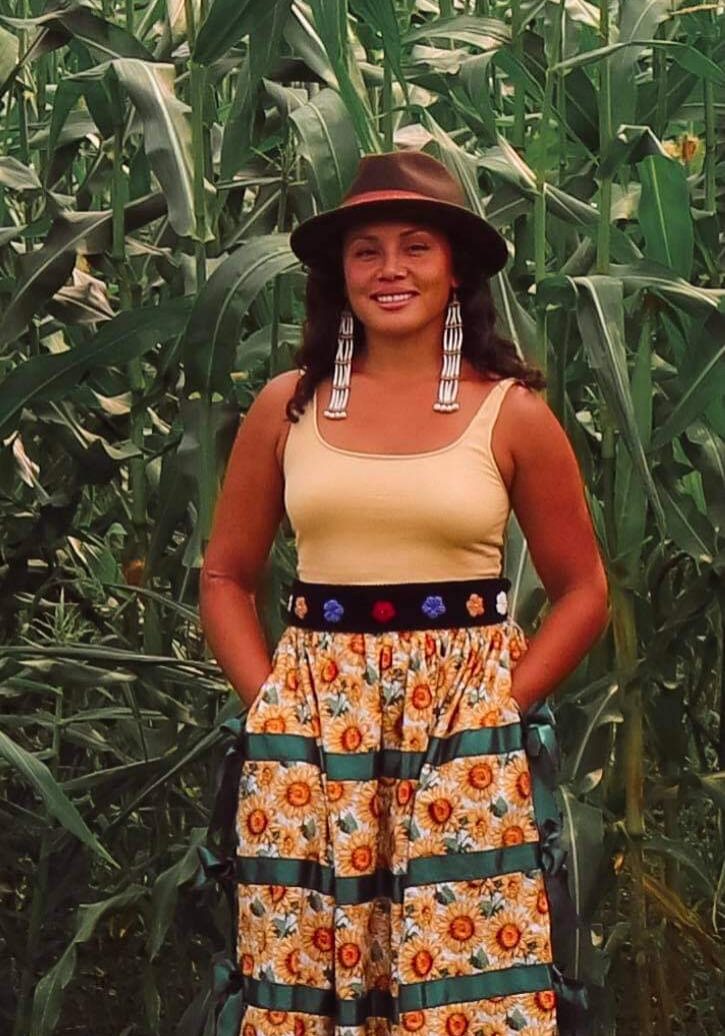
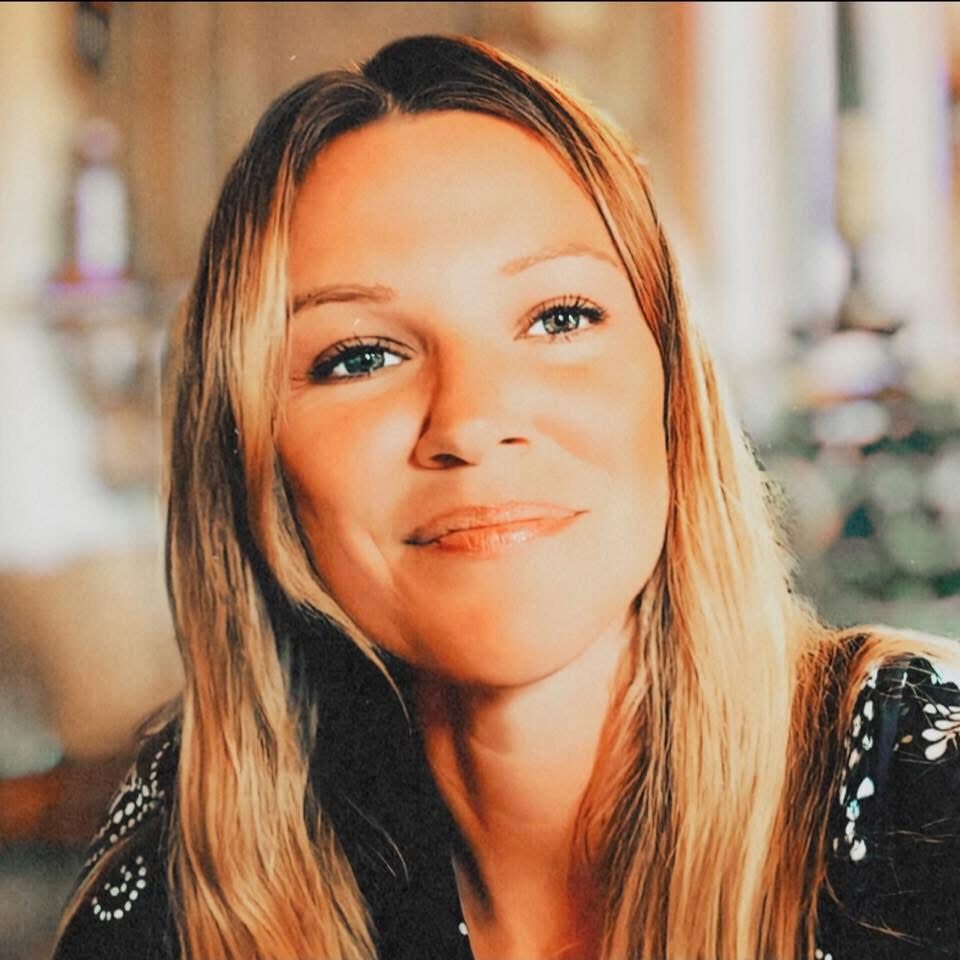
TEIOHONTÁTHE IONTÁKIATS
Teiohontáthe “ Fallan Jacobs” of the kenien'kehà:ka bear clan is a mother of four children who has worked closely with the community of Ahkwesáhsne on economic development, labor market information studies and small business support as a fierce defender of sovereignty and human rights.
Fallan spent twelve years in successful court battle against the Canadian Border Services Agency precipitated by an egregious harassment at the border where she was subjected to unprotected uranium exposure resulting in the loss of her baby. The agency was found guilty of sex discrimination by the Canadian Human Rights Tribunal, the Federal Courts and the Federal Appeal Courts of Canada.
Fallan’s continues to work with Indigenous youth and families to rekindle, restore and enhance their sense of cultural identity with land based teachings and community connections across the province of Ontario. Fallan moved into domestic violence education and is now working for her home community of Ahkwesáhsne thru the Iakionhnhehkwen, an umbrella of beautiful women delivering preventative services to youth and their families.
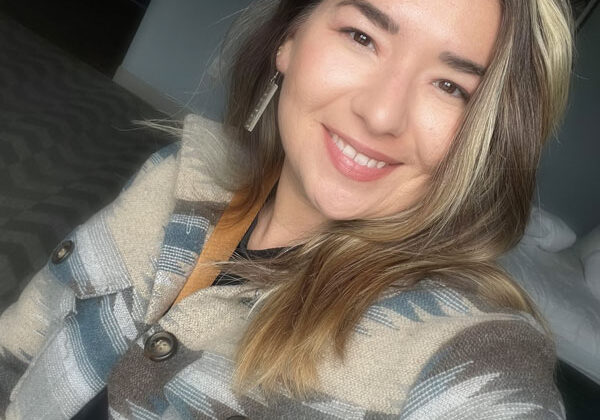
TSIEHÈN:TE IONTÁKIATS
Tsiehèn:te Herne, Bear Clan of Ahkwesáhsne is a mother of two and recently engaged. Tsiehente was recently named the new Director of the Title 6 Program at Salmon River Central School. Tsiehèn:te teaches language art and works closely with students in elementary and high school levels .
Tsiehèn:te is a founding member of Konon:kwe (Goh-noon-gwe) Council, a circle of Mohawk women working to reconstruct the power of their origins through education, empowerment and trauma-informed approaches. Tsiehèn:te weaves an impeccable matrilineal thread in all her work and upholds the language in all her kinship societies.
Currently Tsiehèn:te is a tributary to the Iakionhehkwen life ways and upholds Ratinonhshón:ni philosophies and self-determination regarding women and girls. Tsiehèn:te graduated from Alqonquin College in Ottawa and from Elmira College as a Distinguished Scholar of the Arts. Tsiehèn:te also was chosen to write about building relationships with school and community in an academic journal and lastly she is a proud fluent Mohawk speaker and writer.

KARAKWAHAWI IONTÁKIATS
Karakwahawi iontákia’ts, iakohskaré:wake tánon Ahkwesáhsne tsi non kíe:teron. Karakwahawi has traveled through many realities throughout her twenty three year journey on mother earth. The most recent has been working alongside beautiful strong indigenous women under the umbrella of iakionhnhehkwen.
Karakwahawi holds many titles on earth such as auntie, daughter, granddaughter, partner, friend. All of these partnerships has helped shape her into the being that exists today.
Her goals in life are to make strides to live in partnership and peace with akwe sha’oièren (all of creation). This is what she calls “living the onkwehonwe way”. This includes learning keniekeha, building sustainable housing, learning about our ceremonial songs and teachings, and constantly striving to elevate her vibration.
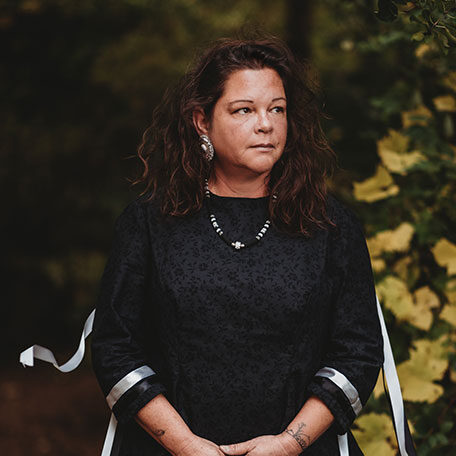
IEHSTOSERANÓN:HA IONTÁKIATS
Iehstoseranón:nha iontiákia'ts wakskaré:wake tahnon Akwesasne kíe:teron. Her government appointed name is Dawn and her birth name is Mary Francis. She is the founder and president of the Indigenous Arts Collective (registered charity) and writer/artist at Pass The Feather. She is a Feather Keeper practicing and sharing traditional bird medicines and a writer and artist creating books and moon time calendars. Dawn is also a graphic and web designer and is passionate about elevating Indigenous voices.
Dawn is an active community member and a volunteer with Haudenosaunee Universe, a helper and Auntie of Ohero:kon, a connected Moon Lodge Society contributor, a sister to Matrilineal Order of the Haudenosaunee and advocate for Indigenous artists and women in business.